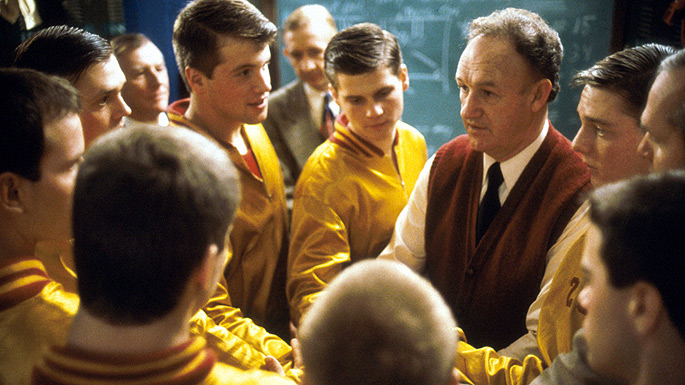

There’s no question that Hoosiers is the best sports movie ever made ever, period. While I’m slightly biased, the film actually appears on most sports movie “top 10” or “greatest” lists. The incredible soundtrack and Gene Hackman’s sweet leather jacket are not the only reasons I adore the film. The ways in which the inevitable themes of judgment and grace are made manifest are what really make me love it.
The film’s protagonist, Norman Dale (Gene Hackman) is the newly hired varsity basketball coach at Hickory High school in Hickory, Indiana. Coach Dale is hired (seemingly as a merciful favor) by Hickory High’s principal and his long-time friend. The Hickory community receives Coach Dale with suspicion, wondering why the former college coach would take a job at a tiny school in the middle of nowhere. Going from coaching in college to coaching at Hickory isn’t exactly upward mobility. One Hickory citizen, who serves as the kind of an assistant and/or interim head-coach, ferociously tells Coach Dale in the middle of practice:
“I don’t know why Cletus [the principal] drug your tired old bones in here. He musta owed you somethin’ fierce.”
What a fitting expression the town’s skepticism of their new coach. The small town of Hickory’s distrust of Coach Dale, is, as you might’ve already noticed, similar to Dillon’s suspicion of Coach Taylor in Friday Night Lights. The identities of both communities are entirely dependent upon their athletic success, or lack thereof.
The character that most suitably personifies Hickory’s anxiety toward the new coach is Ms. Myra Fleener, one of Dale’s fellow teachers at Hickory High. From the get-go, Fleener stands in direct opposition to the coach. Even on his first day on the job, Fleener greets Dale with reluctance—her words, along with her intrusive glare are anything but welcoming. She doesn’t trust Coach Dale a bit, and her scheme to crush him controls her every word/move. Though she seems to genuinely care about the students at Hickory High, her proclivity to control others (namely Jimmy Chitwood) only makes things worse. My take on Fleener is that she is more concerned with Coach Dale because he serves as a threat to her sense of comfort and/or control. Nonetheless, Fleener is absolutely committed to finding out exactly why coach Dale has come to Hickory.
During a later scene in the film, in which Coach Dale and Ms. Fleener are taking a walk, the truth comes out. Fleener pulls an old newspaper article from her coat, which reveals that at his previous job as a college coach, Dale physically assaulted one of his players and was fired. This scene is excruciating to watch. Fleener was right about Dale’s “ulterior motives” in coming to Hickory.
The fact that Fleener’s judgment is true is exactly why the scene so brutal. The law is unfailingly accurate in exposing failure. The law has certainly had its way with Coach Dale.

Meanwhile, the team struggles, losing a game or two. Things are going downhill, and according to the Hickory community, it’s all due to Coach Dale’s unconventional coaching methods (e.g. playing with only 4 players in an awesome scene). Eventually, a town meeting is demanded by the angry Hickory community in order to decide, once and for all, whether Coach Dale is to remain the coach of Hickory High.
With a very court room kind of aura, the scene begins with Coach Dale spilling his heart out—confessing that he coached the team in an honest and diligent manner. When the gentleman officiating the meeting opens the floor for comments concerning Coach Dale, Mrs. Law herself, Ms. Fleener, volunteers to speak. I still remember the first time I saw the film, I cringed watching her walk up to the podium, anticipating the hammer of Myra Fleener to finish him off, to kick him while he’s good and vulnerable.
The moment is here. Everyone is expecting the hammer, BUT (Ephesians 2:4) as she arrives to the podium, Ms. Fleener opens a piece of paper (with tears in her eyes) and reads with a shaky voice:
“I think, in order to be fair… I think it would be a big mistake to let Coach Dale go. Give him a chance.”
This is the last thing you expect from Ms. Fleener, who hasn’t shown an ounce of sympathy for Coach Dale the entire film. Fleener is the ultimate t-crosser and i-dotter, yet, she vouches for the hothead coach—therefore being an agent of grace. “Giv[ing] him a chance” for Fleener translates as, “I know he doesn’t deserve it…I know he has a past, but give him a break.” This is huge. The lawgiver of the narrative proves to be the agent of compassion.
Mrs. Fleener, like all lawgivers (i.e. everyone) has the potential to squash its subject with our ample demands and expectations. Lawgivers stalk their subject, or at least that’s what Fleener did to Coach Dale. One might expect, at any moment of the film, for Coach Dale to cry out:
Think of how wonderful it would be to settle down and live a comfortable life and not think about somebody chasing you down all the time.–Flannery O’Connor, A Good Man is Hard to Find
That’s it. Grace means the chase is over. Throwing her hands up in submission, Ms. Fleener stopped chasing Coach Dale. Grace is the end of chasing.
[youtube http://www.youtube.com/watch?v=y-wOHiKQ95s&w=600]

COMMENTS
2 responses to “The Gospel According to Hoosiers, Part 1: The Brutality of Judgment and the End of Chasing”
Leave a Reply













Sorry, but Hoosiers is a rip-off of Les Miserables.